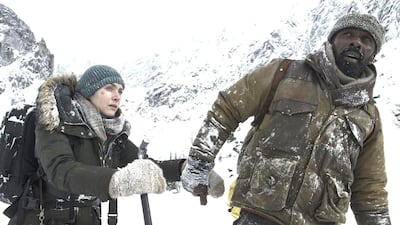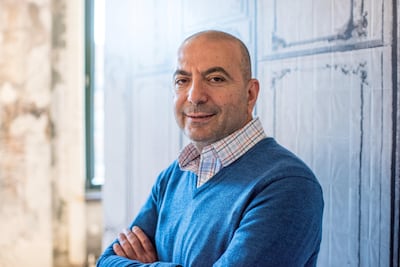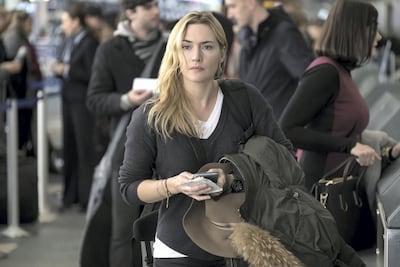It is minus 38°C in the snowy Canadian Rockies, and Kate Winslet's character in new movie The Mountain Between Us has survived a plane crash, a broken leg, hyperthermia and, now, falling through freezing cold ice. Given that her director, Palestinian film-maker Hany Abu-Assad, had made it quite clear that they would be shooting this disaster-romance movie for real, rather than in the comfort of a green-screened studio, what on Earth made Winslet sign up for such an extreme experience? "Dude," she laughs, "I did Titanic. Fall through ice… no problem. Sinking boats or plane crashes… no biggie. You should know I like a challenge."
The Mountain Between Us was certainly that – for everyone involved. On paper, it is the story of strangers Alex (Winslet) and Ben (Idris Elba), who charter a tiny passenger plane to get back to rather pressing engagements: Ben has to perform brain surgery on a 10-year-old boy and Alex is getting married in the morning. But when the pilot (Beau Bridges) has a stroke and dies, sending their plane plummeting into the Rockies, the pair have to rely on each other for survival – both physically and emotionally.
In practise, Abu-Assad admits it was incredibly hard – and rewarding – work.
"It was a huge challenge – both narratively and artistically – to maintain tension with just two characters," he says. "Then we had all the difficulties of being in the field, where it was so cold. We also had to make sure there was just the right combination between the survival and love stories – apart from maybe The African Queen, there aren't a lot of examples of that style. So it felt we were trying something new – original, even."
For Abu-Assad, actually shooting in the Rockies was crucial. Winslet remembers watching, "terrified", as the temperatures steadily dipped the closer they got to the set, and says the environment was so harsh that she actually had to remember to act.
"The scene where she falls in the icy water, we agreed that we'd only try it once," Abu-Assad remembers. "And then it wasn't good, so I had to ask Kate to do it one more time, which she agreed to. She went into the cold water three times – I was amazed by her courage. But when you put yourself in the situation of your characters, you do get a more authentic chemistry and performance."
It is interesting that Abu-Assad was able to elicit such commitment from his stars – Elba has also said he felt The Mountain Between Us would only have worked if it was actually shot in such harsh conditions. Winslet certainly believes that the 56 year-old Palestinian's first American movie – his previous works, Paradise Now and Omar, both receiving Oscar nominations for Best Foreign Language Film – deserved a different kind of working style.
“When I read it, it wasn’t from start to finish a perfect piece of writing, but I loved the idea of it just being these two characters for such a long period of time in these extreme circumstances, this great love story of survival,” Winslet says. “There was something about the enormity of that challenge which was completely irresistible.
"And I had seen Omar and Paradise Now, and what struck me about Hany's film-making is that he always tells a very simple tale with so much buried complexity and human emotion. I just felt that the collaboration would be a really fun one alongside Idris; we would pull this film apart and put it back together again."
Indeed, Abu-Assad says that during the shoot, Winslet would wake him at 3am and tell him ideas for scenes they would film the next day. That might sound like the story needed micro-management – and there are some uneven moments where the set-up, narrative and tone don't quite cohere – but Abu-Assad is certain that in asking for his stars' involvement, he made a better film. "I gave them the space to elevate their scenes to a place I hadn't envisaged before, absolutely," he says. "You have to give them the room to use their talents, otherwise why are you paying them so much money?"
This is Abu-Assad’s first experience of having a major studio behind one of his films. While he argues that the basic principles of Arabic and American film-making remain the same, in the United States, there was no limitation to creativity when he needed a specific shot.
"So the plane-crash scene, I wanted to do in one shot, and it was possible because of the studio's resources," he explains. "After making this movie, I realise I have so much admiration for the narrative of the American movie – but not necessarily the form.
"When I was growing up, it was the images in films from European movie makers such as Andrei Tarkovsky, Krzysztof Kieslowski or Bernardo Bertolucci that haunted me, much more than American movies. But then the stories from American movies began to affect me more. So what unconsciously happened with The Mountain Between Us is that I cultivated both of those admirations – American narrative and European visual storytelling. This marriage is not easy – it's a contradiction actually – but it is who I am and what the film attempts to be."
Without Winslet and Elba, this slight uneasy marriage in The Mountain Between Us might have failed. It is to their credit that although it quickly becomes obvious we are watching an imminent romance rather than a gruelling, The Revenant-style battle against the elements, the exact way in which their characters start to fall in love is quite unexpected. The little quips and moments of quiet comedy work, too – small shards of emotional intimacy that Abu-Assad says were true reflections of how human beings react.
"I know this because I've lived in a lot of extreme circumstances myself and I was amazed that people could still make jokes," he says. "You need to, to carry on, I think, or you'll die."
"What I love about the story," Winslet adds, "is that Ben and Alex go through this experience thinking they're one person and come out of it someone else entirely – and they can never quite go back to how life once was. I think that's perfectly possible. I've seen it happen – when I met my husband, Ned, I felt that happened to me: I just knew things weren't going to be the way they had been before. It's incredibly inspiring when you see that in a film."
The Mountain Between Us is a plane-crash movie that is not about a plane crash; rather, it explores what happens when two strangers find themselves in extreme circumstances and uncover hidden reserves of determination, courage, humour and love. Sometimes, the way they discover them might be faintly cliched, but speaking to Abu-Assad – who has impressively grand ambitions for his first American film – even the wide brush strokes might be intentional.
“Wherever you go, there is crisis,” he says. “Politicians feed difference and anger, and our job as artists in this very difficult time is to unite, to find common interest. So in this movie, maybe you can look at it as celebrating two very different people coming together.
“I hope at least it will encourage people to find the good in others. After all, without love and giving and serving, our society can’t survive. I really want to explore making big movies for wide audiences that have these important messages – and without entertaining, they won’t ever get them.”
_________________
Reading more:
This is watershed moment for society: Clooney
Hollywood producer Mark Gill shares tips and box-office tricks
Gerard Butler about what went on behind the scenes in new film Geostorm
_________________



